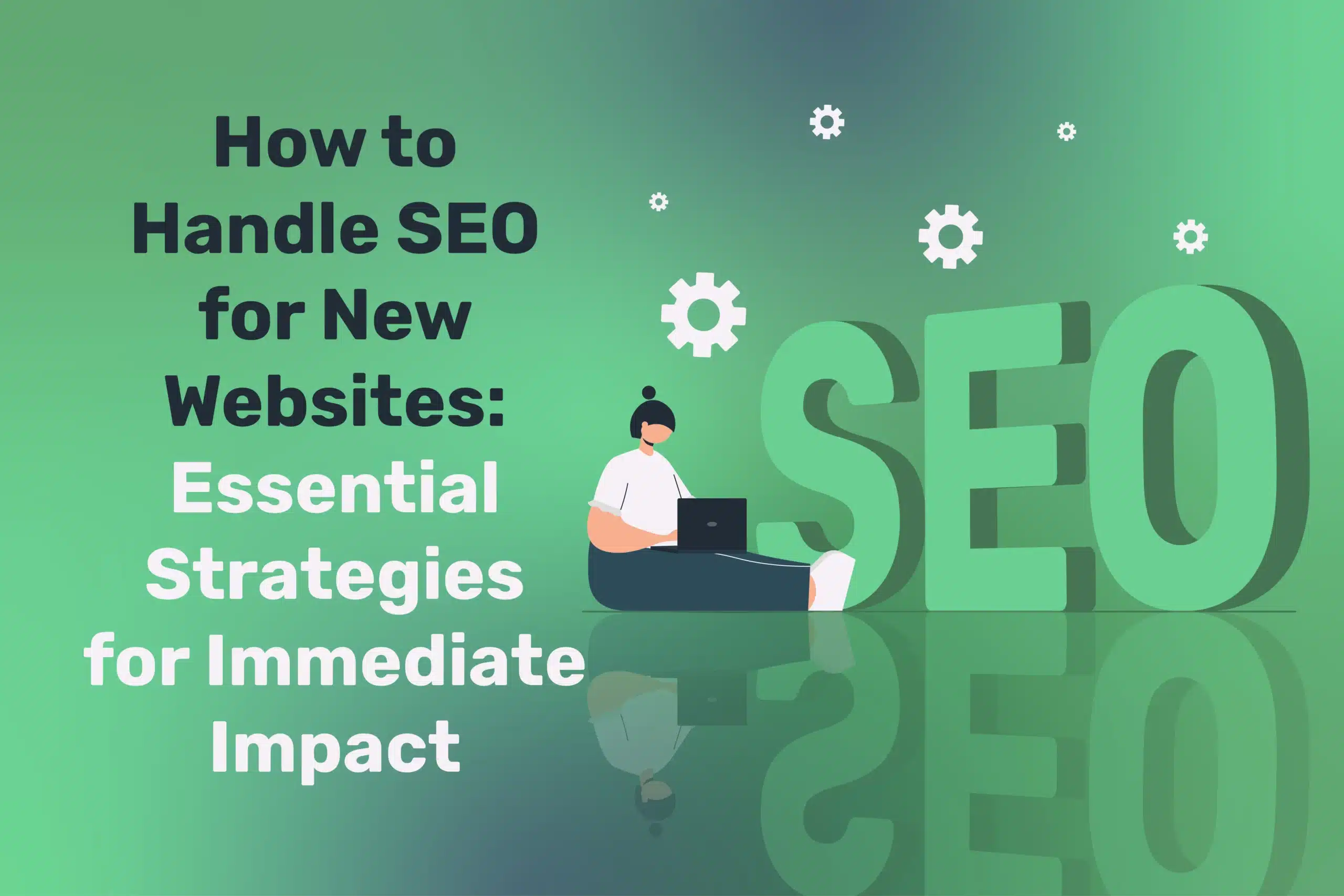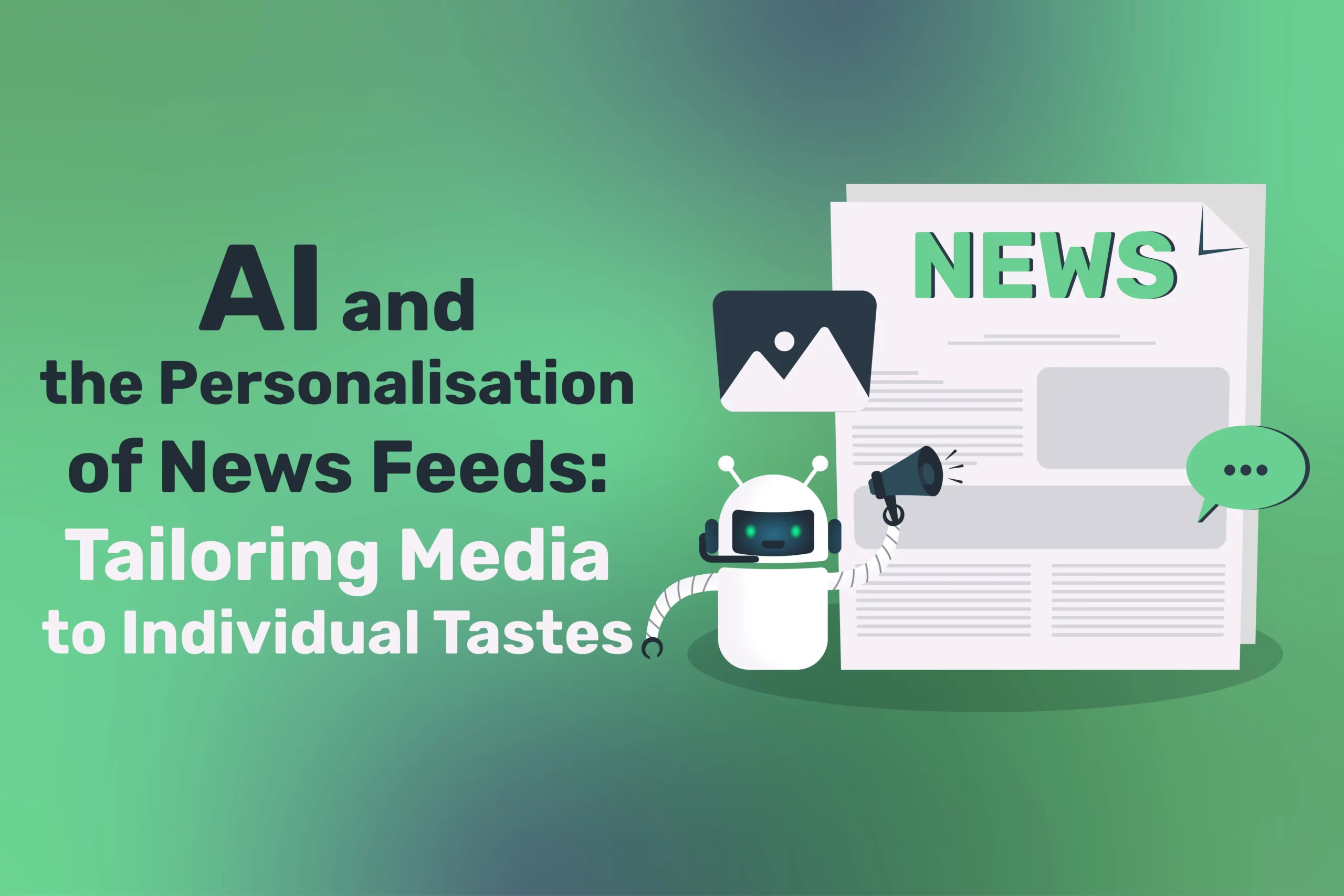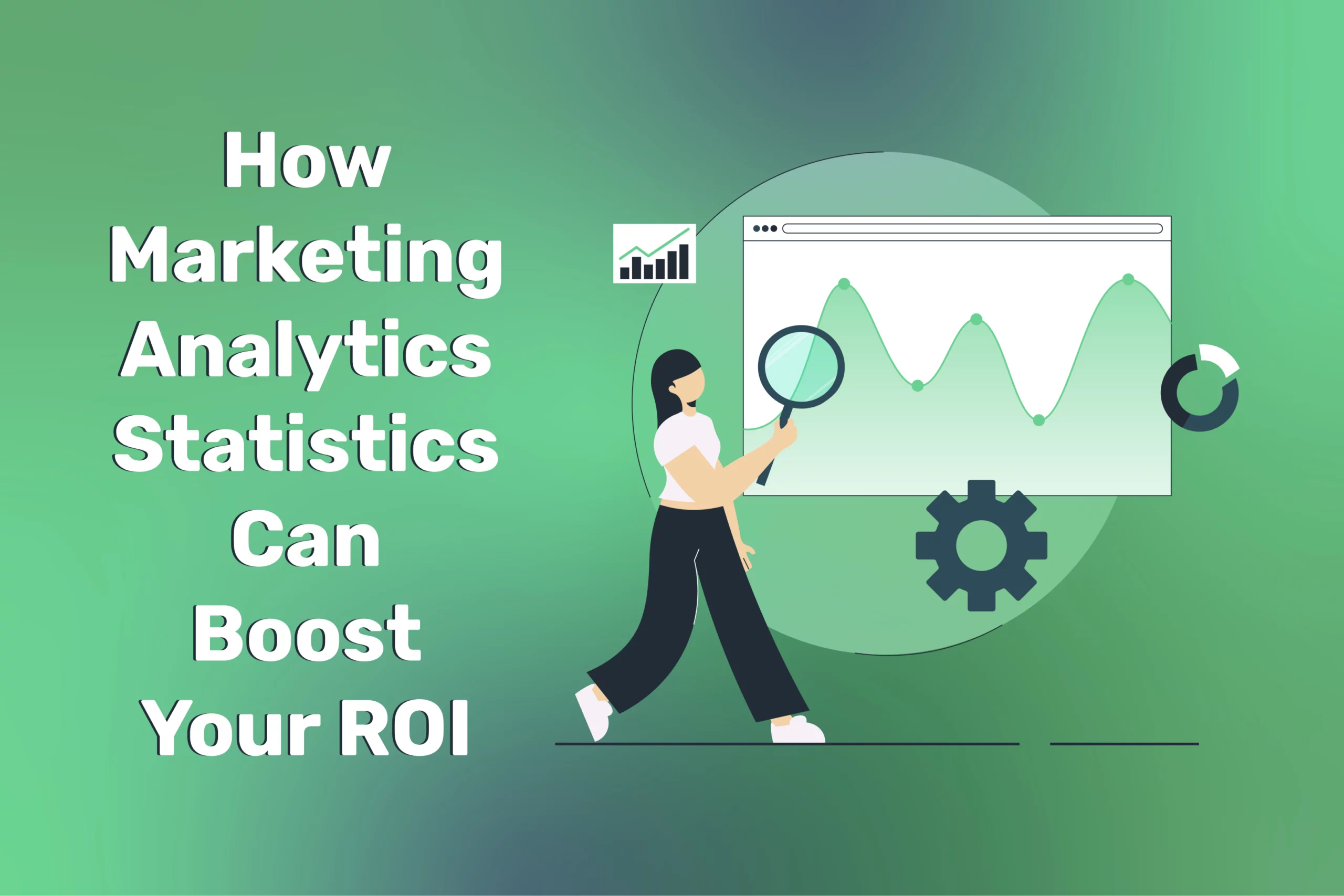
AI Training in 2025: Latest Stats, Trends, and Why It’s Essential
Table of Contents
Artificial intelligence is no longer an emerging technology but a fundamental business driver transforming every sector of the economy. As AI capabilities advance at unprecedented rates, AI training has become a top priority for organisations and individuals looking to stay competitive, productive, and future-ready. This comprehensive analysis examines the current state of AI training, highlighting key statistics, emerging trends, and strategic benefits that make ongoing AI education an essential investment in 2025.
Key AI Training Statistics & Market Trends
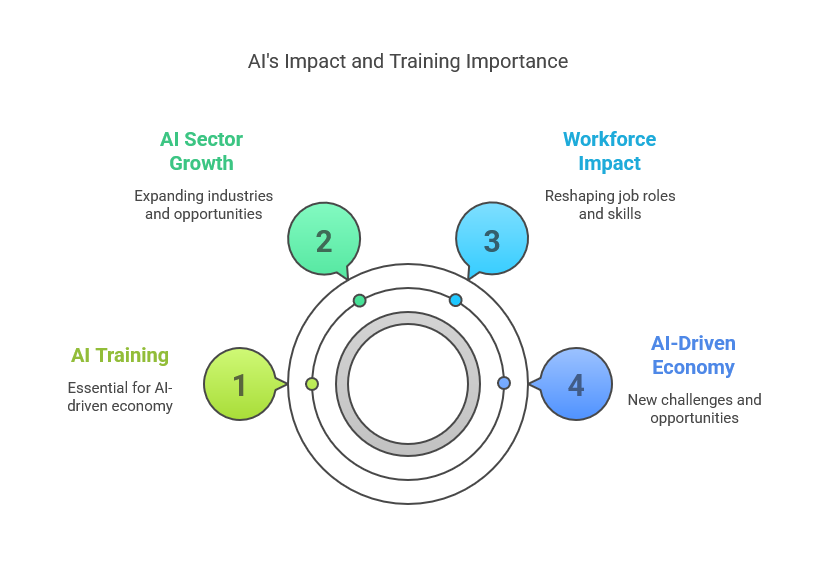
As artificial intelligence continues to reshape industries worldwide, the demand for AI training has surged. The following statistics and market trends highlight the significant growth of the AI sector, its impact on the workforce, and the increasing importance of AI training for individuals and organisations. Understanding these trends is essential for staying competitive in an AI-driven economy, with new opportunities and challenges emerging in every sector.
Explosive Market Growth
The economic impact of AI continues to accelerate dramatically:
- The global AI market is projected to grow at a 37% annual rate, reaching over $305.9 billion by the end of 2024
- AI is expected to contribute more than $15.7 trillion to the global economy by 2030
- Investment in AI startups reached record levels in 2024, with over $125 billion in funding
- 76% of enterprises prioritise AI in their IT budgets, up from 54% in 2023
- AI implementation has moved beyond experimental phases to widespread deployment across business functions
These figures demonstrate the extraordinary economic momentum behind AI adoption and the growing importance of AI skills across virtually every industry.
Workforce Impact and Job Creation
AI is reshaping employment patterns and creating significant new opportunities:
- By 2025, up to 97 million people will be working in the AI space, creating unprecedented demand for skilled professionals
- AI is expected to create 133 million new jobs by 2030, even as it automates specific tasks and roles
- 40% of companies report they now have dedicated AI roles that didn’t exist three years ago
- The most in-demand AI roles include prompt engineers, AI ethicists, machine learning engineers, and AI solution architects
- 85% of the jobs that will exist in 2030 haven’t been invented yet, underscoring the importance of adaptable AI skills
This workforce transformation highlights both the opportunities and challenges created by AI’s rapid evolution.
Corporate Priority and Investment
Organisations increasingly view AI as mission-critical:
- 83% of companies now say AI is a top priority in their business plans, up from 67% in 2023
- 58% of businesses will increase AI investments in 2025, with average budget increases of 32%
- 71% of C-suite executives identify AI training as essential for maintaining a competitive advantage
- 45% of organisations now have dedicated AI teams or centres of excellence
- Companies with formal AI strategies outperform peers by 26% in key performance metrics
These trends demonstrate the shift from experimental AI adoption to strategic implementation as a core business function.
Training Demand and Skills Development
The hunger for AI skills continues to grow across sectors:
- AI and big data skills are now the third overall priority in company training strategies worldwide, and the number one focus for large enterprises
- Over 40% of technology training programmes in major economies are focused on AI and big data
- Demand for AI-related courses on learning platforms increased by 65% in 2024
- 92% of employees believe AI skills will be necessary for their career advancement
- Average salaries for AI specialists are 56% higher than for comparable non-AI technology roles
This surging demand reflects the growing recognition that AI competency is becoming essential for both individual career prospects and organisational success.
The AI Skills Gap Challenge
Despite growing awareness, significant training gaps remain:
- Only 14% of organisations have a formal AI training policy in place, creating inconsistent capabilities
- Just 8% of companies have a skills development programme for roles impacted by AI
- 67% of HR leaders report difficulties finding candidates with appropriate AI skills
- 82% of employees feel their organisations don’t provide adequate AI training
- The median time to fill AI specialist positions has increased to 61 days, up from 48 days in 2023
This growing skills gap highlights the urgent demand for structured AI training and reskilling programmes across industries.
AI Upskilling Drives Productivity
Training in AI delivers measurable performance benefits:
- AI training can boost workforce productivity by up to 37% in some industries
- Companies with comprehensive AI training programmes report 29% higher innovation rates
- Employees leveraging AI tools effectively complete tasks 34% faster than their untrained counterparts
- 76% of managers report that AI-trained teams make better data-driven decisions
- Organisations with widespread AI literacy see 41% higher employee engagement scores
These productivity gains demonstrate the tangible return on investment that practical AI training delivers.
Generative AI Focus
Generative AI has emerged as a particular training priority:
- Generative AI is the most popular AI technology for training, with 51% of companies using it for content creation, customer support, and process automation
- 73% of organisations now include prompt engineering in their technical training programmes
- 42% of non-technical employees receive training in generative AI tools like Chatgpt or DALL-E
- Companies report a 43% productivity improvement when employees are adequately trained in generative AI tools
- 67% of training programmes now include specific modules on the ethical use of generative AI
This focus on generative AI reflects its transformative impact across roles and functions beyond traditional technical teams.
Job Security Concerns
Employee anxieties about AI are driving training demand:
- Over 75% of employees fear job loss due to AI, making reskilling and upskilling programmes critical for workforce stability
- 63% of workers believe AI will significantly change their job requirements within two years
- 81% of employees would feel more secure if their employers offered comprehensive AI training
- Companies offering AI reskilling report 37% higher retention rates
- 59% of employees are pursuing AI training independently if not provided by their employer
These concerns highlight the human dimension of AI transformation and the importance of supportive training approaches.
Why AI Training Is Essential in 2025
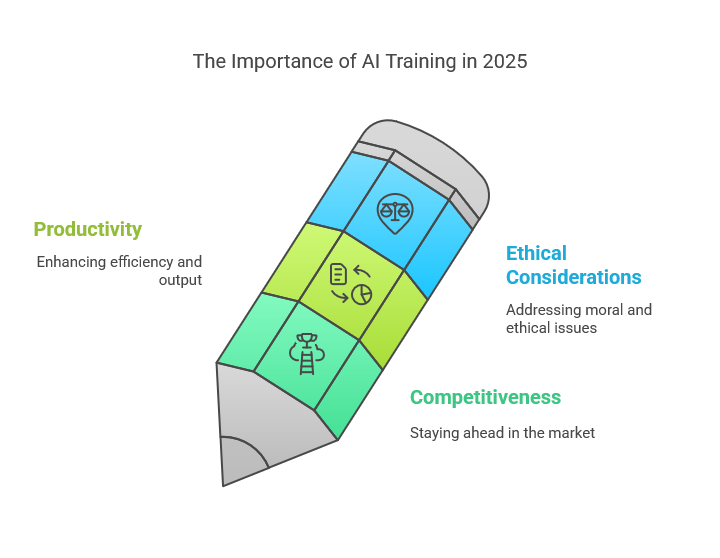
As AI technologies evolve rapidly, the need for continuous, strategic AI training has never been more critical. In 2025, businesses and individuals alike must prioritise AI education to remain competitive, enhance productivity, and navigate the ethical complexities of AI implementation. This section explores why investing in AI training is essential for success in an increasingly AI-integrated world.
Business Competitiveness and Innovation
AI capabilities directly impact organisational performance:
- Companies investing in AI training are better positioned to innovate, automate processes, and adapt to rapid technological change
- Organisations with AI-trained workforces bring products to market 27% faster than competitors
- AI-enabled process improvements reduce operational costs by an average of 22%
- 68% of companies report that AI training has enabled new product or service offerings
- Businesses with widespread AI literacy respond more effectively to market changes and competitive threats
Ciaran Connolly, Director of ProfileTree, notes: “The gap between AI leaders and laggards is widening rapidly. Organisations that invest in comprehensive AI training aren’t just improving technical capabilities—they’re building the foundation for sustainable competitive advantage through faster innovation, enhanced decision-making, and more responsive customer experiences.
Bridging the Critical Talent Gap
Training addresses fundamental workforce challenges:
- AI and big data skills are in high demand, and upskilling is crucial to fill millions of new roles being created by AI adoption
- Internal trAIning programmes reduce recruitment costs and time-to-productivity for AI roles
- Cross-functional AI literacy enables better collaboration between technical and business teams
- 72% of companies find that internal upskilling is more effective than external hiring for AI roles
- Progressive organisations are using AI training to create diverse talent pipelines and reduce demographic gaps in technical teams
These workforce development benefits address immediate skill shortages and longer-term talent pipeline challenges.
Productivity Enhancement and ROI
AI training delivers measurable performance improvements:
- Employees trained in AI can leverage automation and analytics, leading to faster decision-making, improved efficiency, and measurable business impact
- Teams using AI tools effectively complete projects 33% faster with 26% fewer resources
- Customer service representatives with AI training resolve issues 41% faster with higher satisfaction scores
- Marketing teams leveraging AI tools properly generate 38% more qualified leads
- Financial analysis using AI techniques delivers 29% more accurate forecasting
These productivity benefits translate directly to improved business outcomes and competitive advantage.
Responsible and Ethical AI Implementation
Training ensures appropriate governance and risk management:
- Training ensures employees use AI responsibly, mitigating risks related to data privacy, security, and bias
- Organisations with comprehensive AI ethics training experience 68% fewer incidents requiring remediation
- 71% of consumers express a preference for brands that demonstrate ethical AI practices
- Regulatory compliance is significantly enhanced when teams understand AI governance principles
- Ethical AI training reduces the risk of reputational damage from problematic AI implementations
As regulatory scrutiny increases, these governance benefits become increasingly important for sustainable AI adoption.
Education-to-Employment Alignment
Training approaches are evolving to meet practical needs:
- Work-integrated learning, apprenticeships, and partnerships between industry and academia are bridging the gap between AI education and workforce needs
- 63% of successful AI training programmes involve direct collaboration with industry practitioners
- Universities are rapidly adapting curricula to focus on practical AI applications rather than purely theoretical concepts.
- Micro-credentials and stackable certifications are creating flexible pathways to AI careers.
- Work-based learning approaches reduce the time from training to productive contribution.
These evolving approaches help address the chronic misalignment between traditional education and rapidly changing industry requirements.
AI-Driven Learning Experiences
AI is transforming the training process itself:
- AI-powered digital tutors and learning assistants are enhancing engagement, motivation, and learning outcomes for both students and employees
- Adaptive learning platforms reduce training time by 28% while improving knowledge retention
- AI-based skills assessment provides more accurate training recommendations and career guidance
- Virtual mentors and simulations create safe environments for practising complex AI implementation scenarios
- Personalised learning paths increase completion rates by 34% compared to traditional approaches
These innovations make AI training more effective, efficient, and accessible to diverse learners.
Leading Approaches to AI Training in 2025
In 2025, practical AI training requires more than just traditional learning methods. Organisations and learners are adopting innovative, hands-on, and technology-driven approaches to keep pace with the rapid advancements in AI. This section highlights the leading strategies and training methodologies shaping AI education’s future, ensuring that individuals and businesses can thrive in an AI-powered world.
Cohort-Based and Hands-On Learning
Practical, collaborative approaches deliver superior results:
- Short, focused group training with real-world projects and collaborative learning for rapid skill development
- Peer learning and community components enhance knowledge retention and application
- Project-based assessments replace traditional testing to evaluate practical capabilities
- Cross-functional teams work on actual business challenges using AI tools and methodologies
- Time-boxed programmes (8-12 weeks) balance depth with the need for rapid upskilling
These approaches ensure that learning translates directly to workplace application and visible results.
Digital and AI-Powered Learning
Technology enhances the training experience:
- Use of AI tutors, simulators, and adaptive platforms for personalised, self-paced learning
- Virtual reality environments for practising complex AI implementation scenarios
- Natural language interfaces make advanced AI concepts more accessible to non-technical learners
- Continuous assessment and adaptive content delivery based on individual progress and learning patterns
- Hybrid approaches combining self-paced digital learning with live expert coaching and mentoring
These technology-enhanced approaches make training more accessible, personalised, and effective.
Work-Integrated Programmes
Learning embedded in work delivers immediate impact:
- Apprenticeships, internships, and on-the-job training to align skills with industry needs
- Learning assignments are directly connected to business priorities and challenges
- Rotation programmes exposing learners to different AI applications across business functions
- Immediate application of new skills to real-world problems with expert guidance
- Mentoring relationships between experienced AI practitioners and developing talent
This integration of learning and work accelerates both skill development and business impact.
Industry-Education Partnerships
Collaboration creates more relevant training:
- Collaboration between businesses, universities, and training providers to deliver relevant, up-to-date courses
- Co-developed curricula ensuring alignment with current industry practices and technologies
- Guest lecturers from industry providing real-world context and applications
- Shared resources, including datasets, case studies, and technical infrastructure
- Combined academic rigour with practical business application
These partnerships help address the traditional gap between academic learning and workplace requirements.
Continuous Learning and Adaptive Upskilling
Ongoing development maintains currency in a rapidly evolving field:
- Ongoing training to keep pace with evolving AI tools, frameworks, and ethical standards
- Learning subscriptions provide unlimited access to regularly updated content
- Microlearning approaches deliver bite-sized content for continuous development
- Communities of practice for peer learning and knowledge sharing
- Regular skills assessment and personalised learning recommendations
This continuous approach recognises that a one-time training programme is insufficient in a field evolving as rapidly as AI.
Challenges and Opportunities in AI Training
While AI training presents immense opportunities for growth and innovation, it also comes with challenges. From bridging the skills gap to ensuring training programmes align with rapidly evolving technologies, organisations face various hurdles in developing an AI-ready workforce. This section delves into the key challenges businesses encounter in AI training and explores the opportunities for organisations to leverage these challenges as a springboard for long-term success.
Urgent Need for Strategic Training Policy
Organisations must address structural gaps:
- Most organisations lack formal AI training policies, risking skills gaps and inefficient adoption
- Without structured approaches, AI capabilities develop unevenly across teams and functions
- Successful organisations establish clear skills taxonomies and development pathways
- Training governance ensures consistent quality and alignment with business objectives
- Strategic workforce planning identifies priority roles and capabilities for focused investment
These policy foundations ensure that training investments deliver maximal return and strategic alignment.
Reskilling for Job Security and Career Evolution
Workforce transition requires sensitive management:
- With 30% of work hours potentially automated by 2030, reskilling is vital for workforce stability and career growth
- Transparent communication about how roles will evolve with AI reduces resistance and anxiety
- Career pathing shows employees how to develop from their current roles to future opportunities
- Skills adjacency mapping identifies transferable capabilities that can be built upon
- Phased approaches allow gradual skill-building while maintaining productivity
This thoughtful approach to workforce transition maintains engagement and retention during periods of significant change.
Measuring Training Impact and ROI
Demonstrating value drives continued investment:
- Companies that invest in AI training report faster innovation, higher employee retention, and stronger business outcomes
- Effective measurement frameworks link training activities to business performance indicators
- Case studies and success stories make abstract benefits tangible for stakeholders
- Productivity and efficiency gains directly offset training costs
- Long-term competitive positioning and market adaptability provide strategic value beyond immediate metrics
This robust approach to measurement ensures ongoing support for training initiatives by demonstrating clear business value.
The Strategic Imperative for AI Training
AI training in 2025 is not just a technical upgrade—it’s a strategic imperative. With the AI market booming, millions of new jobs emerging, and automation reshaping every industry, structured, ongoing AI training is essential for business growth, workforce resilience, and ethical innovation.
Comprehensive AI training for organisations seeking sustainable competitive advantage delivers tangible benefits: improved productivity, enhanced innovation capabilities, stronger talent attraction and retention, and the agility to adapt to rapidly evolving technologies and market conditions. For individuals, AI skills development provides career security, advancement opportunities, and the ability to thrive in an increasingly AI-augmented workplace.
As the distinction between AI-enabled organisations and laggards continues to widen, one thing becomes increasingly clear: those who commit to systematic, strategic AI training will increasingly outperform those who approach AI skills development in an ad hoc or reactive manner. Investing in AI training now means building a future-ready, competitive, and empowered workforce prepared to harness AI’s transformative potential.
About ProfileTree
ProfileTree is a leading digital training provider headquartered in Belfast, serving clients across Northern Ireland, Ireland, and the UK. Our comprehensive AI training services include courses in generative AI applications, data analytics, machine learning fundamentals, and AI ethics and governance.
Our expert trainers combine practical industry experience with up-to-date knowledge of the latest AI trends and technologies. Whether you seek to enhance your team’s capabilities through customised in-house training or develop your skills through our public courses, ProfileTree delivers practical, results-focused AI education. To learn more about our AI training programmes, visit our website or contact our team directly.
